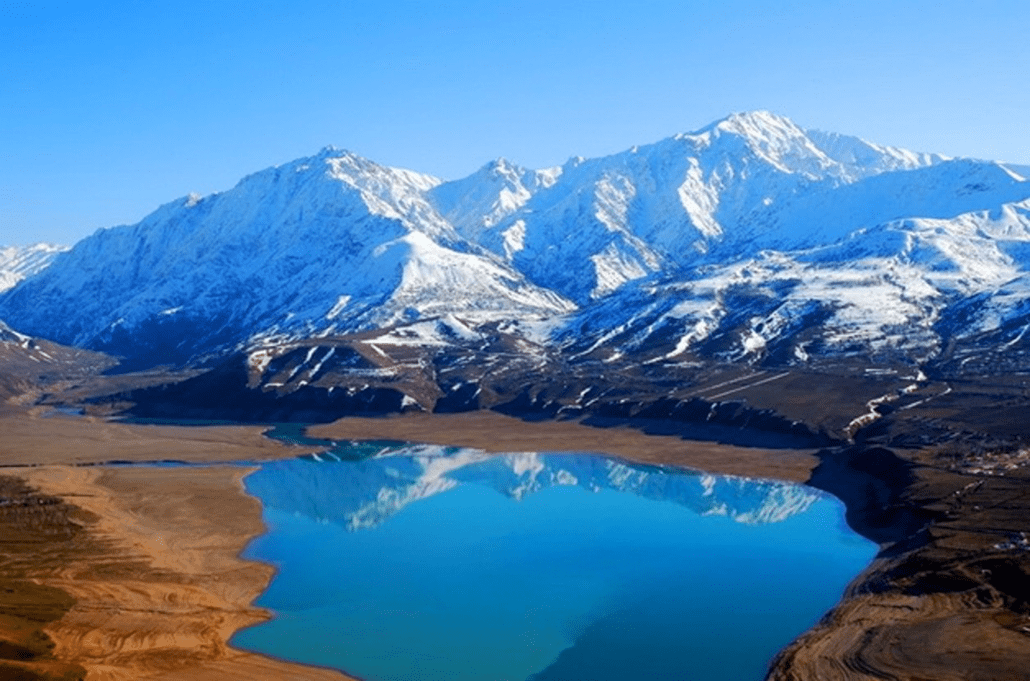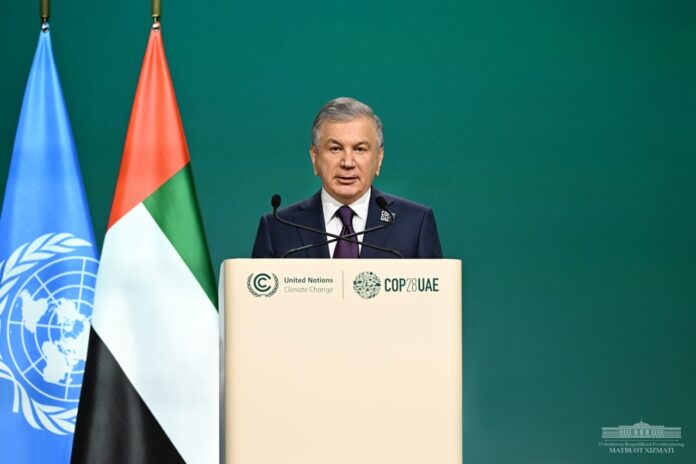In the July 2023 presidential elections, Shavkat Mirziyoyev’s victory was due to a number of factors, including the high level of elaboration of his election program, which contains a whole range of measures to solve the urgent problems of Uzbekistan. Transparent, honest, legitimate and recognised by the international community, the choice of the people of Uzbekistan, on the one hand, is a high trust of the citizens of the country, on the other – a mandate to continue reforms to build a New Uzbekistan.
In September 2023, President Shavkat Mirziyoyev approved the “Uzbekistan-2030” Strategy, the goals of which include creating opportunities for all citizens to develop their potential, raising a healthy and educated generation, building a strong economy and guaranteeing justice, the rule of law and security.

One of the important ideas of the Strategy “Uzbekistan-2030” is the creation of favorable environmental conditions for the population. And earlier, environmental issues were the focus of Sh.Mirziyoyev’s attention, in particular, referring to such an important area as the economy, in fact, the locomotive of reforms, the head of Uzbekistan emphasized the need to unlock the rich potential of Uzbekistan without harming the environment. This means healthy ecology, environmental protection, clean air and prevention of water scarcity in Uzbekistan.
Such an approach to ecology is also connected with the requirements of the Constitution in a new edition, approved on April 30 by the citizens of the country in this eventful year for Uzbekistan. An important of these requirements is the strict implementation and full implementation of the priority principle “In the name of honor and dignity of man” as the main criterion for reforms. At the same time, speaking about human dignity, in Uzbekistan, we mean the creation of decent living conditions and modern infrastructure, qualified medical care, quality education, social protection and a healthy environmental environment for every resident of the country.
Uzbekistan is undoubtedly a supporter of ecological balance, prosperous nature and the fight against climate change, since this issue is very relevant and important for our nation in the context of the direct impact of the largest environmental catastrophe in the world – the Aral tragedy.
Attention to the tragedy of the Aral Sea was also reflected in the speech of Shavkat Mirziyoyev from the high rostrum of the UN. At the 72nd session of the UN General Assembly in September 2017, the President noted: “I would like to once again draw your attention to one of the most acute environmental problems of our time – the Aral catastrophe. Overcoming the consequences of the drying up of the sea today requires active consolidation of international efforts”.
Our country witnessed the severe consequences of the ecological catastrophe of the Aral Sea, which resulted in the loss of specific species of flora and fauna, the degradation of water and land resources, the growing threat of desertification. It should be noted that vast territories of white salt fields covered with sand appeared on the dried-up bottom of the sea, which turned into a new Aralkum desert with an area of about 5.5 million hectares.
In fact, an entire sea disappeared on the eyes of one generation. Specifically, within 50 years, the volume of water in the sea has decreased by more than 15 times and the water level has dropped by 29 meters. The coastline has retreated hundreds of kilometers. Water mineralization has reached up to 150-300 g/l. Today, this catastrophe has outgrown the borders of the region, turning into a global problem.
The Aral catastrophe worsened the climatic conditions in the region, increasing the dryness and heat in the summer, lengthening the cold and harsh winters. In the Aral Sea region, the number of days with a temperature above 40 °C has increased by 2 times, while in the rest of Uzbekistan – by an average of one and a half times. Since the beginning of the 1950s, the average temperature growth rate in the territory has been 0.29 °C per decade, which is more than 2 times higher than the global warming rate. According to experts, by 2035, the air temperature in the Aral Sea region may increase to 3 ° C.
As the next environmental problem, we will highlight the fact that Uzbekistan, like the rest of humanity, is facing the harmful consequences of climate change. Thus, a serious impact on the ecosystem turns into: a reduction in biodiversity; desertification, which absorbs more and more fertile land; natural disasters that occur more often, etc. Most clearly for Uzbekistan, this manifests itself in the form of dust storms. Under the influence of wind gusts strongly dried topsoil rises upwards, creating the effect of dusty-sandy haze with visibility deterioration up to 100-200 m.
These incidents once again clearly demonstrate the importance of special attention to consistent work in the field of environmental protection, ecological safety, rational use of natural resources, and improvement of sanitary conditions. This shows the strategic importance of the implementation of Shavkat Mirziyoyev’s ideas in terms of ensuring decent and favorable living conditions for the people.
Another problem is irrational use of water resources in Uzbekistan against the forecasted water deficit. Experts believe that in some regions of Central Asia the pressure on water resources will triple by 2040. Economic damage could eventually reach 11% of regional gross product. Already now, according to the UN, the regional states lose up to 2 billion dollars annually due to the deficit and inefficient use of water resources.
In this regard, Shavkat Mirziyoyev’s special attention to the ecological sphere is also conditioned by the difficult situation in this sphere. Thus, almost 90% of the fresh water obtained in the country is used in agriculture. For comparison, this figure in the world averages 65%. In Uzbekistan, water consumption per 1 hectare in agriculture is 2-2.5 times higher than in a number of countries. This is due to noticeable losses of water during its delivery to the sowing fields. There are failures in irrigation networks against the backdrop of increasingly lower groundwater levels. The situation is aggravated by the fact that outdated methods and means are still used in the sectors of the economy, social facilities and in the agricultural sector. For example, in the country, water management, their use and distribution, as well as water facilities, have not yet been fully digitalized.
Uzbekistan is also characterized by a low level of water use culture, so water consumption per capita remains high. In the capital Tashkent, water consumption per person per day on some days reaches 400 liters. For comparison, in Berlin this figure is 124 liters.Much has already been done in Uzbekistan to address these and other problems.
Firstly, one of the main documents of the country in the field of ecology is the Concept of Environmental Protection of the Republic of Uzbekistan until 2030, approved on October 30, 2019 by the Decree of the President of the country Sh. Mirziyoyev. This document defined an integrated approach and principles of strategic planning in the implementation of state functions in the field of environmental protection, and also gave the necessary powers to the relevant environmental body to effectively fulfill the tasks set.
Implementation of the Concept has determined the priority directions of the state policy in the field of environmental protection, use of effective mechanisms for prevention, detection and suppression of violations of environmental legislation, strengthening the personal responsibility of heads of state bodies and economic entities, citizens for the sanitary and environmental condition of settlements of the republic, as well as the achievement of the National Goals and objectives in the field of sustainable development for the period up to 2030.
Secondly, the process of improving and modernizing the current regulatory framework of environmental legislation continues. Today there is an active process of radical change of the former system, wide introduction of ecologically grounded method of management instead of administrative management of natural resource use. This contributes to the establishment of legal, economic, social and organizational norms for the preservation of environmental conditions and the rational use of natural resources. Balanced harmonious development of relations between man and nature, sustainable development of ecological systems, natural complexes and individual objects is also ensured, and the rights of citizens to a favorable environment are guaranteed.
Currently, Uzbekistan has more than 30 legislative acts and about 200 by-laws in the field of ecology, environmental protection and rational use of natural resources. Among them are the laws of the Republic of Uzbekistan “On the Protection of Nature,” “On the Protection of Atmospheric Air,” “On Water and Water Use,” “On the Protection and Use of Vegetation,” “On the Protection and Use of Wildlife,” “On Forest,” “On Protected Natural Areas,” “On Subsoil,” “On Waste,” “On Environmental Expertise,” “On Environmental control and others.
This shows that since 2017, the country’s environmental legislation covers many issues of relevant activities, the regulation of the system of state bodies, the distribution of functions and powers between them, the preservation of biological diversity and ensuring access to information, the use of economic mechanisms. Moreover, a number of legislative acts have introduced norms protecting the environmental rights of citizens and developing environmental democracy.
We would like to emphasize that the Committee on the Development of the Aral Sea Region and the Environment is currently functioning effectively in the Upper Chamber of the Parliament of Uzbekistan. The Ecological Movement of Uzbekistan, which is represented by 15 deputies in the Legislative Chamber of the Oliy Majlis, defends environmental rights on the political stage.
Thirdly, Uzbekistan is implementing systematic and comprehensive measures to address the consequences of the Aral Sea disaster. Particular attention is paid to the implementation of a special resolution of the United Nations General Assembly on the declaration of the Aral Sea region as a zone of environmental innovation and technology, adopted at the 75th session on May 18, 2021.
The value of the initiative of the President of Uzbekistan to turn the Aral Sea region into a zone of environmental innovation and technology is as follows:mobilizes funds specifically for the socio-economic development of the Aral Sea area;gives an integrated approach to the assistance provided by avoiding duplication;directs funds to ensure the sustainable development of the region;contributes to the innovative development of the Aral Sea region on the basis of mechanisms that bring targeted and tangible benefits to the residents of the region in the field of healthcare, provision of drinking water, job creation, education and more.
In particular, research on cultivation of 18 drought-tolerant plants is underway in the Aral Sea region. The site of scientific lysimetric studies on the basis of more than 10 types of soils from the dried bottom of the Aral Sea was constructed. Agro-ecotourism project “My Garden in the Aral Sea” was developed, more than 5.126 ornamental and desert-resistant trees were planted in the exhibition areas.
According to the August 2023 Decree of President Shavkat Mirziyoyev, new business support measures will be introduced in Karakalpakstan. It is planned to allocate $200 million in preferential loans for companies, as well as to create a Youth Socio-Economic Center for 1 trillion soums in Khojaili district of the Republic of Karakalpakstan. The center will include an IT park, a technology park, startup support groups, cultural and spiritual centers, libraries, a sports complex and housing for employees and resident entrepreneurs.
Also, state guarantees for loans for business projects in Karakalpakstan will be increased to 75% of the loan amount, and the maximum guarantee amount will be 5 billion soums. Entrepreneurs fulfilling investment obligations in small and youth industrial zones will be able to privatize the land and real estate allocated to them, as well as receive state property on a competitive basis.
On the initiative of Uzbekistan, the UN Multi-Partner Human Security Trust Fund for the Aral Sea Region was created and operates (MPHSTF). Along with the creation of an inclusive dialogue mechanism as a single platform for the development of international cooperation and the mobilization of funds from the donor community, the MPHSTF is also an instrument for overcoming the consequences of the Aral disaster. Within the framework of the Unified Strategy, the Trust Fund promotes the attraction of new knowledge, innovative solutions and technologies to the Aral Sea region to ensure the sustainable development of the region, which can become a kind of hub of environmental innovation and technologies.
So, today a lot of work is being done to combat desertification. In the last few years, forest plantings have been carried out on the dried-up seabed of the Aral on an area of 1.7 million hectares. We intend to create protective green screens on another 400 thousand hectares in the next two years. To mitigate the consequences of the Aral Sea disaster and conserve biodiversity in the Aral Sea region, natural parks and reserves and state reserves were created over an area of more than 3.5 million hectares.
All this contributes not only to the maximum volume of sand retention, to the prevention of further degradation of natural resources, but also to the formation of a favorable ecosystem, and will also create conditions for climate mitigation in this region.
The International Fund for Saving the Aral Sea has a 30-year history. The role and significance of this structure lies in addressing issues of countering environmental challenges, developing coordinated approaches to the implementation of joint programs and projects in the Aral Sea basin. This Fund, first of all, is a unique experience of multilateral cooperation of the Central Asian countries in solving one of the most acute problems of global scale. From the point of view of Uzbekistan, in the context of the emergence of new challenges and threats due to global climate change, the demand for such regional cooperation is even more increasing.
Fourth, one of the most important results of Uzbekistan’s environmental policy since the election of Shavkat Mirziyoyev in 2017 has been measures to significantly improve the quality of life in areas with a high degree of risk to human health and the stabilization of ecosystems, such as the Aral Sea region.
On behalf of the Head of state, measures have been developed and are being implemented to accelerate the development of all spheres of life in Karakalpakstan. For example, each district of this territory has its own “growth points”. Business entities for a number of activities are exempt from paying land tax, property tax, turnover tax for small enterprises, profit tax for individual entrepreneurs for a period of three years.
New industrial enterprises in Takhtakupir, Bozatau, Shumanai districts, which have a low level of development, were granted tax and customs privileges. To effectively solve problems, specific ministries and banks are assigned to each district and city. In Karakalpakstan, specific programs are in place to mitigate the negative impact of the Aral disaster, provide employment and reduce poverty, and support agriculture. For example, in the academic year 2023/2024, an additional 3 thousand places were allocated for admission to universities on the basis of a state grant for youth of Karakalpakstan.
Fifth, Uzbekistan realizes that the way to efficient use of water resources is to create sustainable agrifood systems by making them more sustainable. According to Shavkat Mirziyoyev, accelerated development, a radical increase in its efficiency and diversification of agriculture as a strategic industry are extremely important for Uzbekistan. Cluster-based processing of products and ensuring food security are urgent tasks in this area.
Currently, the transition to a cluster system has created the basis for dramatic changes in a short period of time. In particular, in the cotton sector alone, fiber processing has increased 2.5 times since 2017 and has been brought to 100 percent. The ecological significance of the clusters’ work is manifested in the fact that they have already implemented water-saving technologies on 126 thousand hectares and commissioned 143 thousand hectares. Most clusters harvested 35-40 quintals of cotton per hectare in 2022.
Sixth, Uzbekistan has joined the Global Commitments to Reduce Methane Emissions and intends to reduce their volume by 30% by 2030. The country continues to take measures to bring the coverage of the population with the collection and removal of solid household waste to 100%, to increase the level of processing of generated household waste to 65%, as well as to widely implement the principles of the circular economy. This will enable the complete reclamation of more than 200 landfills and create new jobs.
At the beginning of 2022, a project was launched in Uzbekistan to convert landfill gas into electricity at two major landfills, which is a vivid example of the country’s commitment to combating climate change.
Seventh, since 2017, Uzbekistan has set a strong path for the widespread introduction of renewable energy sources. Uzbekistan belongs to sunny countries, so clear weather is observed here over 320 days a year. This means that Uzbekistan can potentially receive energy in the amount of more than 182 million tons of oil equivalent per year. This is almost three times the amount of energy currently consumed in the country.
Today, large-scale solar energy projects attract international private investors to Uzbekistan. One of the projects is the “Tutli” solar station, fully developed by the French company Total Eren and launched in July 2022. The total amount of foreign investment in the project is about 100 million euros. The installed capacity of the station is 131 MWt. It generates about 270,000 kWh per year and supplies electricity to 140,000 households.
Uzbekistan’s recent reforms have paved the way for international private investment in renewable energy projects. In particular, the state gives long-term guarantees for the purchase of “green” electricity. Also, the International Finance Corporation, part of the World Bank Group, helps Uzbekistan structure private public partnership (PPP) projects in the field of renewable energy sources.
By the beginning of 2023, projects with a total capacity of more than 1000 MW in solar energy have been implemented, 800 MW is at the stage of tenders. Tenders are of great interest to international investors, including investors from Saudi Arabia, UAE, China, Japan, Korea, etc.
In this context, it should be noted that not only solar and wind energy are prospective in Uzbekistan. In some areas, there is potential for biothermal energy, and in places where livestock are successfully developing, there is the possibility of obtaining biogas.
Eighth, Uzbekistan does not remove the construction of a nuclear power plant from the agenda. Today, the work continues within the framework of the intergovernmental agreement on cooperation in the field of nuclear energy between Russia and Uzbekistan. The main goal is to comprehensively study technologies, train future personnel, etc., in order to eliminate any risks. The project plans to build a nuclear power plant with reactors of VVER-1200 type with a capacity of 1.2 GWh in Jizzakh region.
In parallel, Uzbekistan is considering the issue of small modular reactors, that is, modern nuclear reactors of relatively small size, which can be built at the plant, and then transported and put into operation at any prepared site. In other words, they can be built into the existing infrastructure of thermal power plants, from which coal-fired boilers will need to be removed. Small reactors, unlike large classical reactors, are much safer and do not need strict safety measures, such as the creation of an evacuation zone around nuclear power plants.
Ninth, in the process of the country’s transition to a “green” economy in 2019, the Concept for the Development of Environmental Education in the Republic of Uzbekistan was approved. Work continues to further improve state standards, develop scientific potential, revise the educational process and the system of advanced training for training personnel in relevant specialties. Teaching aids, textbooks, visual and didactic materials for educational institutions at all levels are published.
However, these and other environmental measures do not limit the activities of Uzbekistan in the future. In the period of government, until 2030, Shavkat Mirziyoyev sets clear objectives in the field of ecology, first of all, to save water resources and environmental protection. Thus, within the framework of increasing the culture of rational water use and efficiency of water consumption in the republic, it is planned to increase by 25 percent the efficiency of water use, by bringing the total area of land covered by water-saving technologies for watering crops to 2 million hectares, including drip irrigation technologies up to 600 thousand hectares. Also, it is planned to develop a National Water Saving Program in Uzbekistan.
Attention will also be paid to the continuation of active bilateral mutually beneficial cooperation with neighbouring states in the issues of integrated management of water resources, mutual use of transboundary water resources, and interstate water management facilities. Uzbekistan believes that the problem of water shortage in Central Asia has become not only acute and irreversible but will continue to worsen.
In this regard, it is important to further strengthen systematic interaction on attracting investments, technologies, and technical assistance to promote priority regional projects. Uzbekistan is in favour of developing long-term development plans for the Amudarya and Syrdarya basins under the International Fund for Saving the Aral Sea with the participation of international consultants. This will make it possible to model different scenarios of situation development in the basins of these rivers, which will contribute to a coordinated policy of integrated water and energy resources management in the Central Asian region.
A large amount of work is to be done in the sphere of ensuring rational water use in the agricultural sector. So, by 2030, the task is to increase the share of concrete pavement to 18.7 thousand kilometres, or 66 percent of main and inter-farm canals with a land channel of up to 13.1 thousand kilometres or 46 percent. As a result of the construction and reconstruction of reclamation facilities, to achieve a reduction of saline areas up to 1.7 million hectares on irrigated land plots. It is planned to reduce irrigated land areas with a strong and medium level of salinity to 430.0 thousand hectares, land areas with a problematic state of groundwater to 773.4 thousand hectares.
Uzbekistan will continue to solve the problems of developing the irrigation system and water-saving technologies, the widespread introduction of private sector and public-private partnership mechanisms into management.
As part of the environmental protection reform, Uzbekistan plans to implement measures to radically improve the environmental situation in the republic, eliminate environmental problems affecting human life. These include the introduction of the practice of continuous publication of environmental data to the public on official websites and in the media.
The national project “Yashil Makon” aimed at stabilizing the environmental situation is continuing and will be expanded. In particular, planting 200 million tree seedlings annually and bringing the level of greening of the country to 30 percent, creating a system of care and irrigation for each tree planted. Creation of public parks in urban and district centres for every 50-100 thousand population.
In Uzbekistan, the area of forests will be expanded, in part, the creation of 26,200 hectares of protective forest plantations to preserve land from erosion and reclamation objects from sand run-off. In the Aral Sea region forest plantations will be brought to 2.3 million hectares, and at the bottom of the dried Aral Sea the creation of additional 600 thousand hectares of green areas, or increase their total volume to 2.6 million hectares or up to 80 per cent of the territory.
As part of the prevention of atmospheric air pollution, strong measures will be taken to preserve its natural composition. This includes a 10.5 percent decrease in the number of pollutants emitted into the atmosphere by Uzbekistan. Complete modernisation of polluting technologies in economic entities belonging to I and II categories of environmental impact, construction and reconstruction of local drainage and sewage treatment facilities at 249 industrial enterprises.
In conclusion, we will quote the words of Shavkat Mirziyoyev, where he clearly stated that “We have adopted large-scale programs for the further development of our unique potential, the transformation of our country into a powerful industrial space, a modern country producing high-tech, innovative, high-quality products competitive on the world market, and we will definitely implement them”. At the same time, Uzbekistan understands that it is important not only to solve current issues, but also to forecast possible threats for at least the medium-term perspective. Accordingly, global climate change will lead to an increase in average annual temperatures by two to three degrees in the northern zone and one degree in the southern zone on the territory of Uzbekistan by 2030, thereby significantly changing the conditions of agriculture, and, consequently, ensuring national security. This means, environmental problems are no longer private issues, but directly affect the interests of the whole society and the foundations of the state as a whole. This explains the close attention of the President of Uzbekistan to environmental issues.






